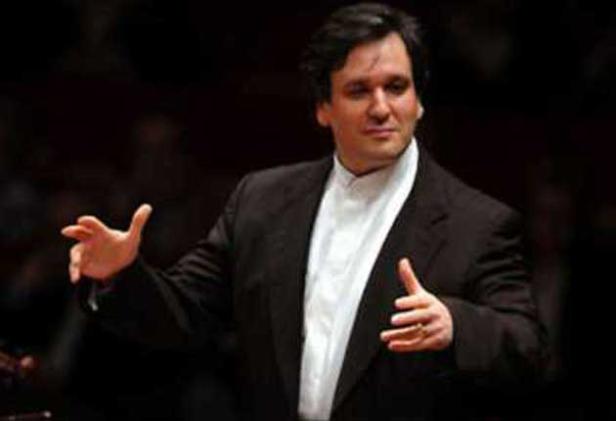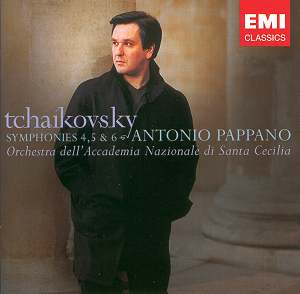2008 (1762)
2009 (1498)
2010 (796)
2011 (759)
2012 (633)
2013 (449)
2014 (575)
2015 (323)
2016 (276)
2017 (470)
2018 (127)
2023 (1)



Recorded in concerts at Sala Santa Cecilia, Auditorium Parco della Musica, Rome,
Verdi: Messa da Requiem - Antonio Pappano (Ganassi, Arteros,Villazon, Pape)
Antonio Pappano (born 30 December 1959, Epping, England) is a British conductor and pianist of Italian parentage.
Currently Music director of the Royal Opera House, Covent Garden and the Orchestra of the Accademia Nazionale di Santa Cecilia in Rome, Antonio Pappano was born in London of Italian parents. At the age of 13 he moved with his family to the United States, where he continued his studies in piano, composition and conducting. Work as a repetiteur and assistant conductor rapidly led to his engagement in theatres throughout the world: New York City Opera, Gran Teatro del Liceo (Barcelona), Frankfurt Opera, Lyric Opera of Chicago and the Bayreuth Festival, where he was assistant to Daniel Barenboim for Tristan und Isolde, Parsifal and the Der Ring des Nibelungen.
In 1987 Pappano made his debut as an opera conductor with La bohème at Den Norske Opera in Oslo and was appointed Music Director there in 1990. During this period, he also made his conducting debuts at Covent Garden (La bohème, June 1990), English National Opera, San Francisco Opera, Lyric Opera of Chicago, Théâtre du Chätelet and Berlin Staatsoper.
At the age of 32 Pappano was named Music Director of the Théâtre Royal de la Monnaie and remained in this post for ten years. In 1993, Pappano made a notable debut at the Vienna Staatsoper, replacing Christoph von Dohnànyi at the last minute in a new production of Wagner’s Siegfried, for which he received unanimous acclaim. He made his debut at the Metropolitan Opera, New York, in 1997 with a new production of Eugene Onegin and in 1999 at the Bayreuth Festspiele conducting a new production of Lohengrin. From 1997 – 99 he was Principal Guest Conductor of the Israel Phiharmonic Orchestra.
Pappano has also conducted the Chicago Symphony, the Philadelphia Orchestra, the Cleveland Orchestra, the Boston Symphony, the New York Philharmonic Orchestra, the London Symphony Orchestra, the Philharmonia Orchestra, the Münchner Philharmonie, the Berlin Philharmonic Orchestra and the Royal Concertgebouw Orchestra.
He has recorded Don Carlo for EMI Classics (CD and DVD) as well as La bohème, La rondine (awarded Best Recording of the Year by Gramophone Magazine), Il trittico, Massenet’s Werther and Manon, Madama Butterfly, Tosca, Il trovatore, Tristan und Isolde, and the Verdi Requiem. His orchestral recordings with the orchestra of Santa Cecilia include Tchaikovsky Symphonies 4, 5 & 6 and Respighi’s Roman Trilogy and he has also partnered Hanna Chang, Leif Ove Andsnes and Maxim Vengerov in concerto recordings and Ian Bostridge in recital.
He was awarded ‘Artist of the Year 2000’ by Gramophone, the 2003 Olivier Award for Outstanding Achievement in Opera and the Royal Philharmonic Society Music Award 2004. In December 2008 Antonio Pappano was made a Commendatore of the Republic of Italy.
In recent seasons at the Royal Opera House, Antonio Pappano has conducted the complete Ring cycle, the world premiere of Sir Harrison Birtwistle’s The Minotaur, and new productions of Don Carlo and Lulu. This season includes new productions of Tristan und Isolde and Prokofiev’s The Gambler.
In future seasons, he will make his operatic debut at the Teatro alla Scala in Milan (Manon Lescaut ) and conduct Il Trittico, Parsifal, The Trojans and Les Vepres Siciliennes at Covent Garden.
Pappano的柴可夫斯基第4-6交响曲
作者:王琳琳
柴可夫斯基:第4-6交响曲
演奏:圣西西里亚国立学院乐团/Antonio Pappano(指挥)
Antonio Pappano一直是我“只闻其名,未闻其声”的指挥家。作为新生代的一线指挥家,他一直被认为主要精力是放在歌剧领域。比起Christian Thielemann、Daniele Gatti、Franz Welser-Most等人近年来“到处开花”和大师地位的树立,以及Daniel Harding、Esa-Pekka Salonen,甚至MTT等人的猛烈宣传攻势,Antonio Pappano几乎给公众的印象一直是一个歌剧指挥,而且几乎是只擅长意大利歌剧,其能量与号召力都不及前列数位“大人物”。他没有过于显露的政治野心,没有过多的唱片出版,没有俊俏得可供大力包装的外表,甚至Antonio Pappano这“意大利专有姓名”都会让人们不知不觉的低看一眼……。包括此次在EMI录制的柴可夫斯基最后三首交响曲:一个近年来名声不如前的唱片公司,三首近年来几乎被口水淹没的作曲家的作品,一个曾经半死不活的二流“意大利乐团”外加一个歌剧指挥,还是新生代的。这唱片给人的第一印象是很难买回家听的那种。不知道EMI的唱片经理是否考虑过出这张唱片的市场风险,当然,也可能是这些经理人是真正的懂得老柴以及Antonio Pappano的价值!
我初听这张唱片时,是在完全不知此唱片资料以及演绎者的情况下听的——是在“魔术号角”刚推出试用的Radio里面听到的。“柴四”第一乐章的圆号引子几句一出来,我觉得这肯定是一个俄罗斯乐队的声音——吐字干净,声音统一,音头明显并且有少许的有节制的干涩。随着音乐的进行,我这种想法越来越肯定。此版本指挥对于柴可夫斯基总谱的阅读已入木三分。所有段落的转接以及分句的逻辑把握得相当准确,这种情况在很多非俄罗斯籍的指挥大师演绎中并不多见。听到“柴五”第二乐章的时候,我几乎断定这是穆拉文斯基指挥圣彼得堡的录音,虽然和DG版的少有不同,比如一些对F(强)稍弱处理是以前没有在穆老的DG录音中听到的以外,这个版本的风范几乎完全是穆拉文斯基似的。解释准确,总谱研究透彻,结构严整洗练,并在此基础上充分地丰富。
多数西方指挥家在处理老柴的交响乐时,在理解这些作品的时候容易“印象多于分析”。柴氏的旋律突出,和声以及内声部织体较于德奥体系的交响乐相对单一一些,切动机材料的发展也不象德奥交响乐那样集中。所以演奏这些交响乐时,容易处理相对平面,即使是所谓的“交响化处理”也多于强调一些无关大局的内声部与副旋律;故而容易使人产生老柴的音乐单一且情绪化的印象。这也许正是西方一些指挥家指挥这些作品有所局限的主要症结。要知道,在专心处理一条旋律的同时是非常容易忽略了音乐内在结构运动的。柴氏的旋律写作少有的漂亮,而他的音乐结构也常常被指挥家所忽略。
而Antonio Pappano对柴氏交响乐的结构处理却有着不同以往的重视。他显然不是那种“为了一些效果而不惜损失一些结构的指挥”。这张唱片的三首交响乐都演绎得有张有弛,并且严格地按照乐曲结构的指示形式,把握之准确令人称道。每首交响乐四个乐章的速度设置也是非常合理的,并且完全尊崇于柴氏的总谱。使之把柴氏音乐的本来结构面貌呈现出来。
在准确的结构处理之外,Antonio Pappano也并不仅仅是一个“结构准确而缺乏光彩细部”的指挥。他对乐曲的一些长线条力度渐变的过程有着独到的处理,他深刻地了解到老柴音乐进行中真正的高潮释放的点,而在此之前的过程,Antonio Pappano始终有所保留,以保持真正高点释放的新鲜感与强烈程度。他深刻的认识到,老柴绝不是那种来回来去滥情的作曲家,他对情感释放的高点是非常吝啬的!把这点参透之后,Antonio Pappano的渐强气息非常的长,上升趋势非常有设计,造成的音乐情感张力极大,但丝毫不影响真正高点释放的淋漓酣畅与一泻千里。
指挥家通常会在总谱中找到他们认为非常有效果的注脚,这是指挥家的天性。而指挥家也非常容易为了这些效果以及心得而忽略其他一些重要的艺术原则和处理线索。这也是一些指挥家的习惯。而真正伟大的音乐处理往往是在一次演奏的时间内满足了各种艺术要求与规格,并使之自然的通过声音充分地表现出来。这套老柴交响乐的演绎中可以看出,Antonio Pappano的演奏规格是非常全面并且到位的。他在表现层面时游刃有余,几乎没有因技术不富裕而处理蹩脚的地方。“让作品去说话”的艺术理念得以充分的条件和发挥。
最后是一个有趣的问题,在指挥界,很多指挥一生都在追求多指挥一些歌剧,因为他们相信,在能够自由自在地指挥歌剧以后,指挥起交响乐自然会轻车熟路。因为指挥歌剧对指挥驾御能力以及多方面控制力是最好的训练与充实。然而一般意义上的一个歌剧指挥则往往容易把音乐处理成流水帐似的进行,因为歌剧作品往往相对冗长且结构相对零散。当他们指挥交响乐时也容易流于粗糙。这就是大家对很多“歌剧指挥”齿冷的主要原因。但当一个指挥可以把歌剧指挥到真正的艺术层面时,他指挥的交响乐自然会是精品。这也是我们大家所熟知的交响乐指挥大师绝大部分也都是歌剧大师的原因所在。显然,听了Antonio Pappano的老柴,并了解了他的背景,他显然不是那种一般意义的歌剧指挥家。这也使我对他的歌剧唱片发生了浓厚的兴趣,要知道这样的柴可夫斯基不是每天都能听到的,我想人们有理由相信,他——Antonio Pappano会制造出更多的精品。



